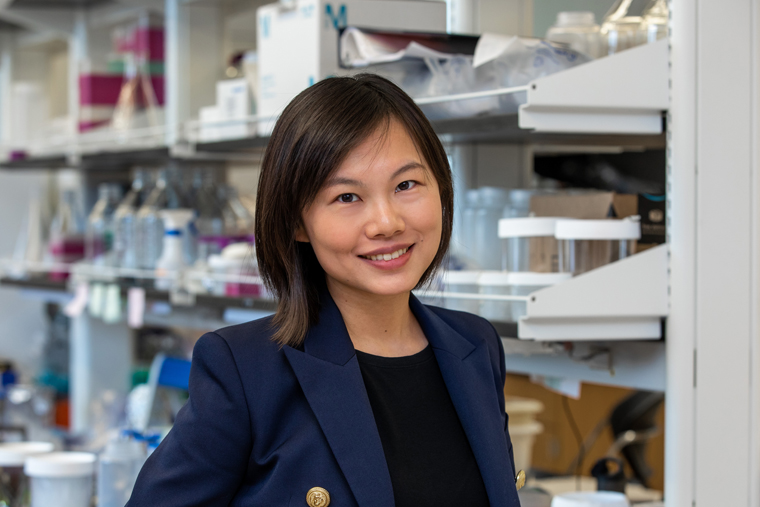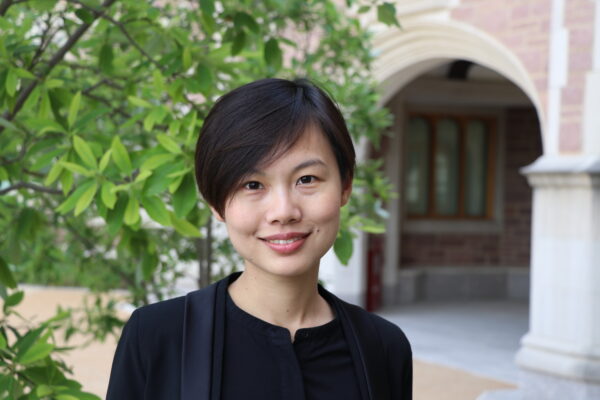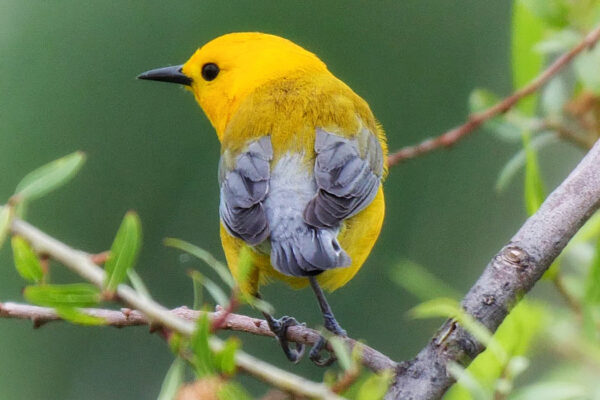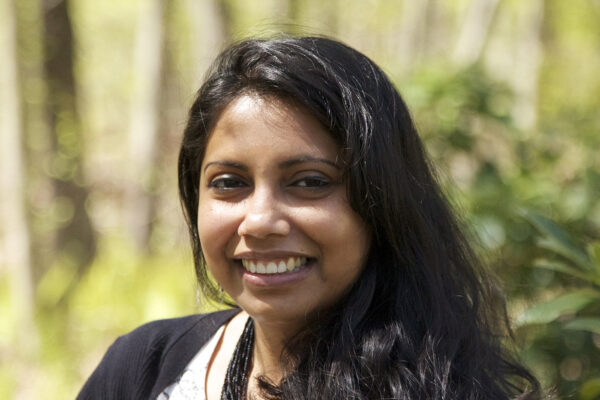There are some people who seamlessly blend knowledge and passion. Fangqiong Ling is one of those people. Her love for science is palpable; her ability to use science to improve society is what makes her a standout in her field.
Ling’s love for science began at an early age. She grew up in China, surrounded by a community of people who encouraged her to delve into science and technology.
“A kind of defining moment for me was in high school, when Beijing had the chance to host the Olympics,” said Ling, assistant professor of energy, environmental and chemical engineering at the McKelvey School of Engineering. “That’s when I started to look around and say, ‘We experienced this much economic growth, are we paying attention to our environment?’”
Through her high school science club, she and her classmates worked with a professor at Beijing Normal University to study the benthic invertebrates — organisms such as insect larvae and worms — in the scenic ponds in Beijing, with the goal of using the identity and diversity of those organisms to indicate water quality.
“I found field work and data analysis really fulfilling,” Ling said.
Now as a faculty member at Washington University in St. Louis, she created a program that does the same for high school students in the St. Louis community.
She and her PhD students are working with the Institute for School Partnership on a funded outreach program called “OurH2hOme.” Her team works with St. Louis families to study the microorganisms found in the water in local homes. The program helps to connect WashU experts with the local community.
“We have a shared interest in water quality within homes, and we were delighted when Fangqiong reached out to us to integrate our expertise on lead in drinking water with her group’s focus on the microbiome of premise plumbing,” said Daniel Giammar, the Walter E. Browne Professor of Environmental Engineering at the McKelvey School of Engineering and one of Ling’s colleagues. “I admire Fangqiong’s creativity and her enthusiasm for engaging with students and teachers in citizen science.”
‘Engaging our local community also allows us to explore new scientific hypotheses about water microbiology. The benefits are really mutual.’
Fangqiong Ling
Ling and her team have packed water sampling kits. Her students have trained more than 10 teachers at three local high schools, and the teachers in turn train the students to complete the scientific study.
This effort was especially beneficial for high school students during the pandemic when they were away from their labs. Ling started planning the program after she joined the university in 2018.
“Engaging our local community also allows us to explore new scientific hypotheses about water microbiology,” Ling said. “The benefits are really mutual.”
From drinking water to wastewater
Ling has expanded her research to the world of wastewater-based health studies during her time at the university. She develops methods to analyze samples from sewer collection systems to understand issues about population health.
“When we go to a hospital, we are often asked to give a fecal or urine sample. Imagine the city’s sewer collection system as taking in everyone’s fecal samples,” Ling said. “Sewage samples, analogous to urine and fecal samples of the city, may teach us something useful for improving public health,” Ling said.
Studies using sewage to track COVID-19 have taken place nationwide since the start of the pandemic. Ling’s research aims to make sewage-based health studies more accurate by estimating human population counts from sewage samples. Her work has the potential to help expand the utility of sewage samples to broader applications, including future pandemics.
“What attracts me the most about developing technologies to facilitate sewage-based health studies is its ability to perform assays at scale,” Ling said.
Ling’s research on the microbiomes of water and sewage has earned her many accolades since joining the university. She has received awards including the Faculty Early Career Development Award from the National Science Foundation in 2021 and the 2020 Rising Star Award from the International Water Association and the International Society for Microbial Ecology. In addition, she was named one of Popular Science magazine’s “Brilliant 10” in 2021.
A tale of two turtles
Ling’s research interests have expanded to the nonprimate members of the community as well. Ling also has worked on a Living Earth Collaborative (LEC)-funded project that monitors two populations of box turtles to examine different life expectancies and the role of the microbiome in different populations.
The LEC grant gave Ling and her team the opportunity to work with the Saint Louis Zoo’s Institute for Conservation Medicine to monitor the turtles.
“I was thrilled when Fangqiong contacted us to ask if we could add a microbiome study to the St. Louis Box Turtle Project,” said Sharon L. Deem, director of the zoo’s Institute for Conservation Medicine and of its WildCare Institute’s Chelonian Center of Conservation. “We all immediately knew she was on to something important, and we got straight to work. However, I think Fangqiong was even more certain and thrilled when she met her first box turtle in Forest Park. She is a serious scientist, but her love of nature also shines through.”
A dedicated researcher
Ling has worked with colleagues from the McKelvey School of Engineering and the School of Medicine in her efforts to study both drinking water and wastewater.
Prior to coming to WashU, Ling earned her bachelor’s degree in environmental engineering from Tsinghua University. She then earned her doctorate from the University of Illinois at Urbana-Champaign before beginning her postdoctoral research at the Massachusetts Institute of Technology.
After all of that schooling, she jumped at the chance to pursue a position in the McKelvey School of Engineering at WashU. She leads a research group using integrated experimental and computational methods to study microbiomes of the urban environment.
“I’m honored to be surrounded by inspiring colleagues in the Department of Energy, Environmental and Chemical Engineering,” Ling said.
Her research has expanded from her training in the microbiology of water systems to broader urban environments while at WashU. She is now teaching the type of courses she took as a student more than 10 years ago and is able to incorporate what she has learned out in the field into the classroom.
Outside of the classroom, she appreciates that her biodiversity research allows her to collaborate with researchers at other institutions such as the Saint Louis Zoo.
“The breadth of Fangqiong’s research is astonishing,” said Jonathan Losos, the William H. Danforth Distinguished University Professor, professor of biology in Arts & Sciences and LEC director. “She has become an integral part of the St. Louis biodiversity community and has established exciting collaborations with researchers at a number of institutions.”



